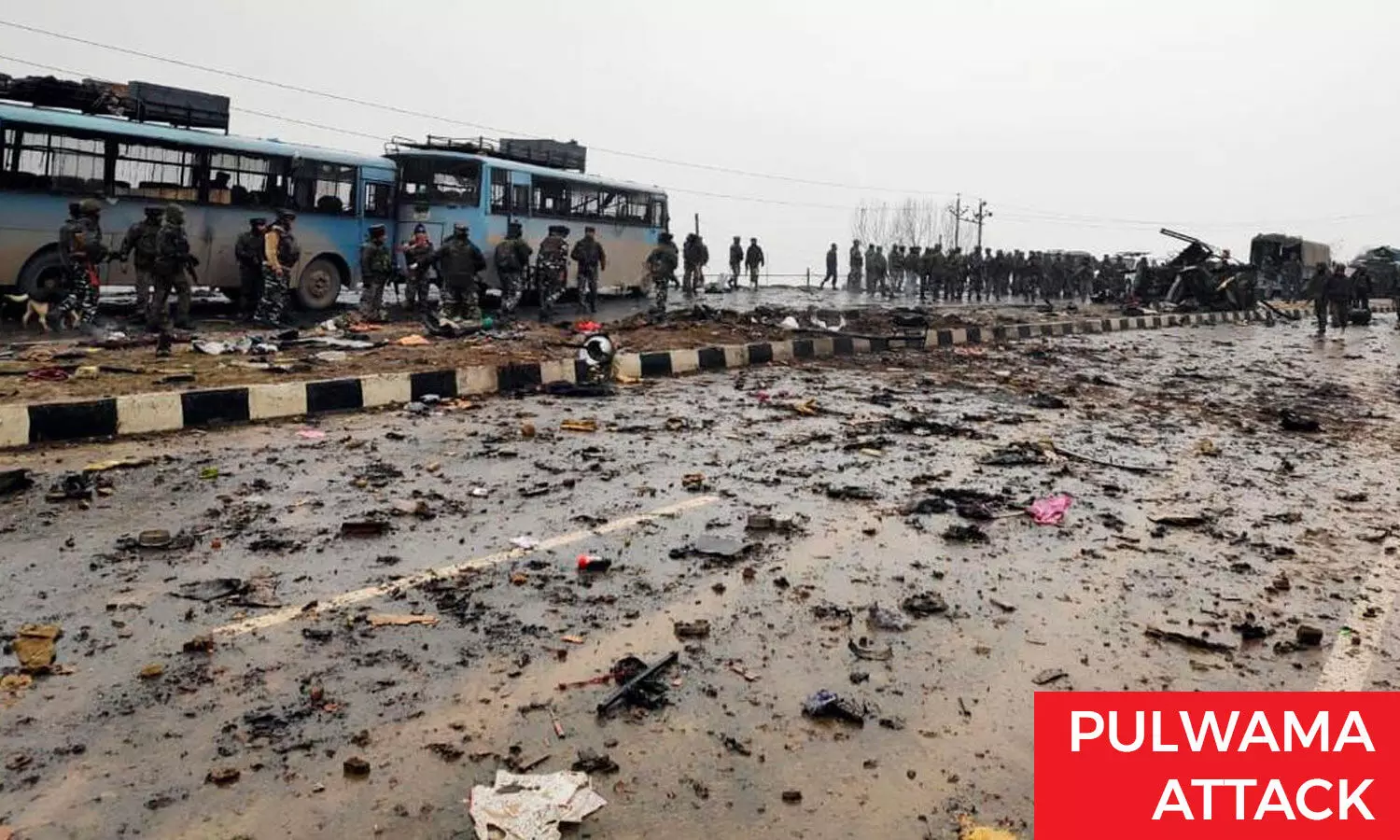5 Years of Pulwama Attack: Staining the Glorious History of Kashmir
A suicide bomber executed a terrorist assault in Pulwama, Jammu and Kashmir, on February 14, 2019, which claimed the lives of forty CRPF personnel. Adil Ahmed Dar, a suicide bomber affiliated with Jaish-e-Mohammad, collided with a CRPF convoy bus with his vehicle.
image for illustrative purpose

The roses above the coffins scream angrily, and the tricolour surrounding our soldiers weeps silently. Profound respect and salutations to all the CRPF jawans martyred in the Pulwama attack. Jai Hind!
‘The horrific Pulwama terror attack, which killed forty CRPF members, took place five years ago on February 14. A suicide bomber targeted a convoy of security vehicles travelling on the Jammu Srinagar National Highway in the Pulwama district of Jammu and Kashmir. Forty Central Reserve Police Force (CRPF) jawans lost their lives in the attack.’
On February 14, 2019, a vehicle-borne suicide bomber, Pulwama attack mastermind, Adil Ahmad Dar, a Pulwama district-born Kashmiri national, attacked a convoy of vehicles carrying Indian security personnel along the Jammu–Srinagar National Highway in Lethapora, Pulwama district, one of the former states of Jammu and Kashmir. Forty Indian Central Reserve Police Force (CRPF) personnel were killed in the assault. The Pakistani Islamist terrorist organization Jaish-e-Mohammed claimed accountability for the attack. The attack was a major setback for relations between India and Pakistan, which led to the 2019 military standoff between India and Pakistan. After that, investigations in India found 19 people to be responsible. By August 2021, seven people had been arrested and six others had been killed. The main suspect had also been killed in the attack. This was the deadliest assault on Indian soldiers in decades.
The Attack:
On February 14, 2019, the Pulwama attack date, a convoy of 78 vehicles transporting over 2,500 Central Reserve Police Force personnel from Jammu to Srinagar was travelling along National Highway 44. The convoy had left Jammu around 03:30 IST, carrying a large number of personnel due to the highway being closed for two days prior. The convoy was scheduled to arrive at its destination before sunset. Around 15:15 IST, a bus carrying security personnel was hit by a car carrying explosives in Lethpora, near Awantipora. It caused a blast, killing 40 CRPF personnel from the 76th Battalion and injuring many more. The injured soldiers were shifted to the Army Base Hospital in Srinagar. The Pakistan-based militant group Jaish-e-Mohammed released a video of the assailant, Adil Ahmad Dar, a 22-year-old from Kakapora who joined the group a year ago. Dar's family last saw him in March 2018, when he left the house on a bicycle and never returned. Pakistan denied involvement, although Masood Azhar, the leader of Jaish-e-Mohammed, is known to operate in the country. It is the most gruesome terror attack on Indian state security forces in Kashmir since 1989.
Aftermath of Pulwama attack:
The National Investigation Agency (NIA) sent a 12-person team to investigate the attack alongside the Jammu and Kashmir Police.
Initial investigations indicated that the car was carrying more than 300 kilograms of explosives, including 80 kilograms of RDX, a high explosive, and ammonium nitrate. Lt Gen Hooda stated that the explosives could have been stolen from a construction site. He initially denied that they had been smuggled across the border, but later said he couldn't rule it out. The National Investigation Agency was able to determine and confirm the identity of the suicide bomber after DNA samples from fragments of the car used in the attack matched Adil Ahmad Dar's father. Despite a year of investigation, the NIA was unable to determine the source of the explosives. The NIA filed a charge sheet in August 2020, naming 19 accused.
State funerals for the security personnel killed in the attack were held in their hometowns. The government of Punjab announced ex gratia compensation of ₹12 lakh each to the families of the killed security personnel in the state, as well as a government job for the next of kin. India revoked Pakistan's most favoured nation status. The customs duty on all Pakistani goods was increased to 200%. The Indian government urged the Financial Action Task Force on Money Laundering (FATF) to include Pakistan on the blacklist. India’s Pulwama attack revenge is the surgical strike that killed almost 400 terrorists.
Wrapped in tricolour, shiny metals stuck to the chest, a hero arrived home in a casket full of depth. Alas!

